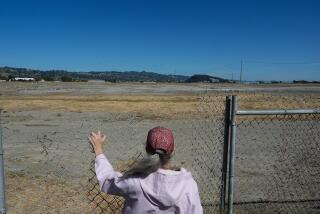FBI Pokes Around in Mud for Anthrax Clues
- Share via
FREDERICK, Md. — Federal investigators used rakes and tree limbs Friday to pick objects from the muck at the bottom of a drained pond as they hunted for evidence in the deadly anthrax attacks in the fall of 2001.
Among the items fished out of the gray-brown mud were sodden bits of what appeared to be stiff fabric or flexible plastic. One investigator took photographs, and various points near the bank were marked with bright pink flags.
The FBI is seeking clues to the origin of anthrax-laced letters that killed five people and sickened 17.
FBI agent Larry Faust of the Baltimore field office declined to comment on the search.
The Washington Post reported last month that divers recovered items from the pond over the winter, including a clear box with holes that could accommodate gloves. Also recovered were vials wrapped in plastic.
Several FBI and Justice Department officials, speaking on condition of anonymity, have told Associated Press that investigators believe someone could have used these items to safely insert anthrax spores into envelopes underwater. Testing of the items has not produced definitive evidence of anthrax contamination, the officials said.
The one-acre pond is in a city-owned forest about 50 miles northwest of Washington and eight miles from the Army Medical Research Institute of Infectious Diseases at Ft. Detrick, the primary custodian of the strain of anthrax found in the envelopes sent in the mail.
Dr. Steven Hatfill, a bioterrorism expert who once worked as a researcher at the institute, has been described as a “person of interest” in the investigation. Hatfill has denied any involvement in the attacks.
The FBI drained the pond of its 4- to 5-foot-deep water, and by Friday all that remained were a few puddles.
Agents wore hip waders or boots as they picked through the muck, and one had to be pulled free of the mud by his co-workers. They used rakes, tree limbs and a branch duct-taped to a rake handle to reach into the basin for evidence.
More to Read
Sign up for Essential California
The most important California stories and recommendations in your inbox every morning.
You may occasionally receive promotional content from the Los Angeles Times.













